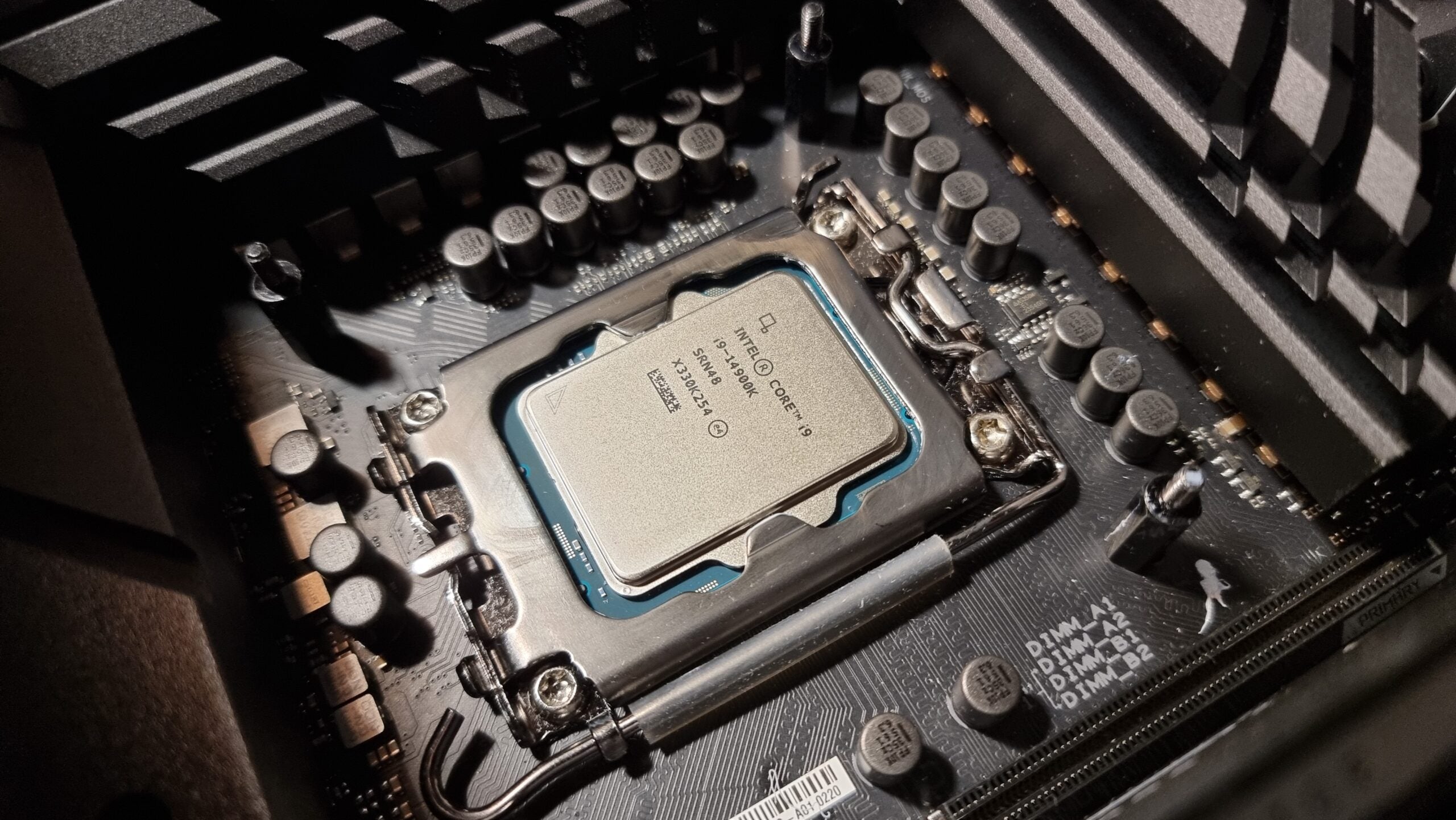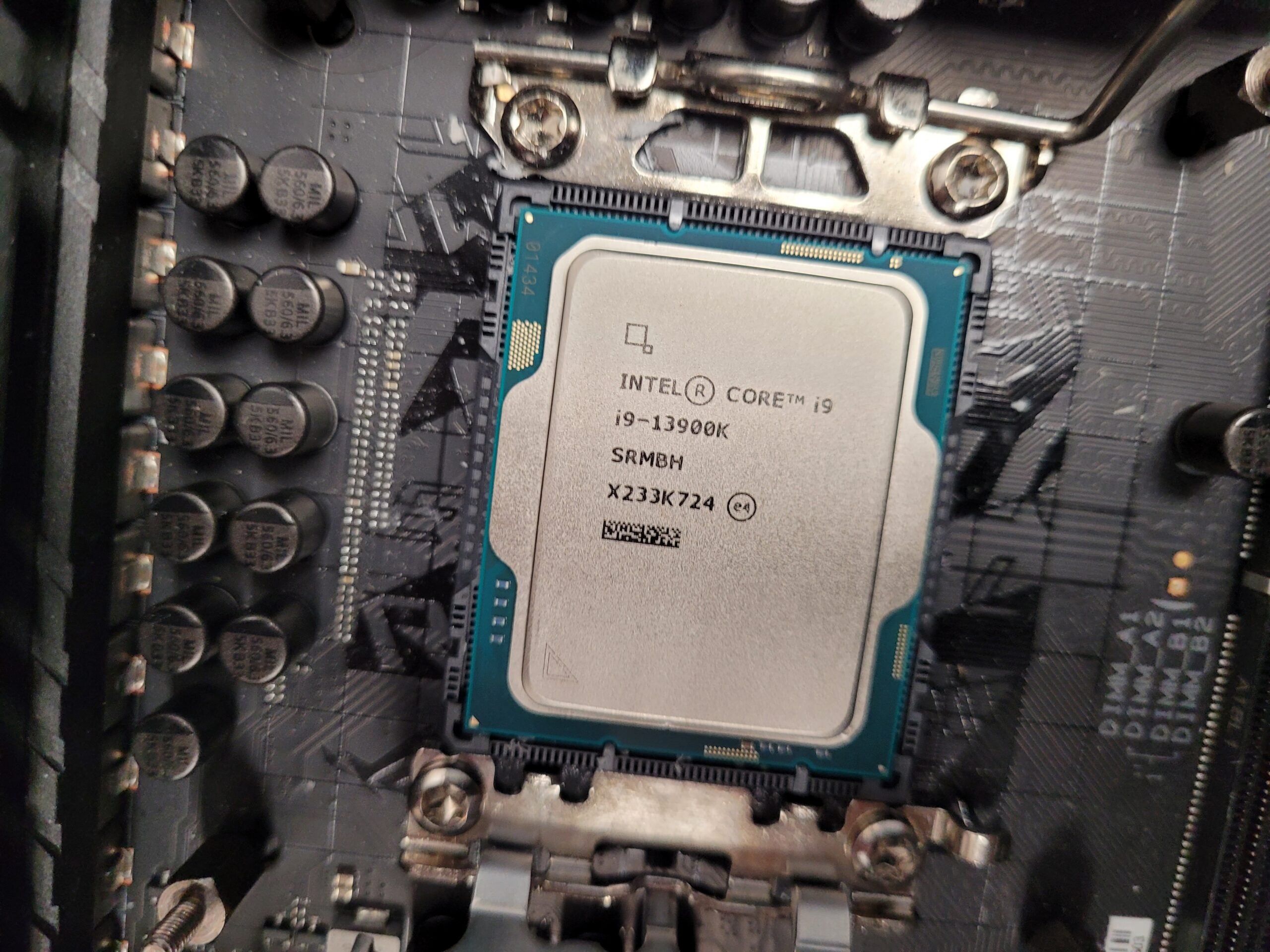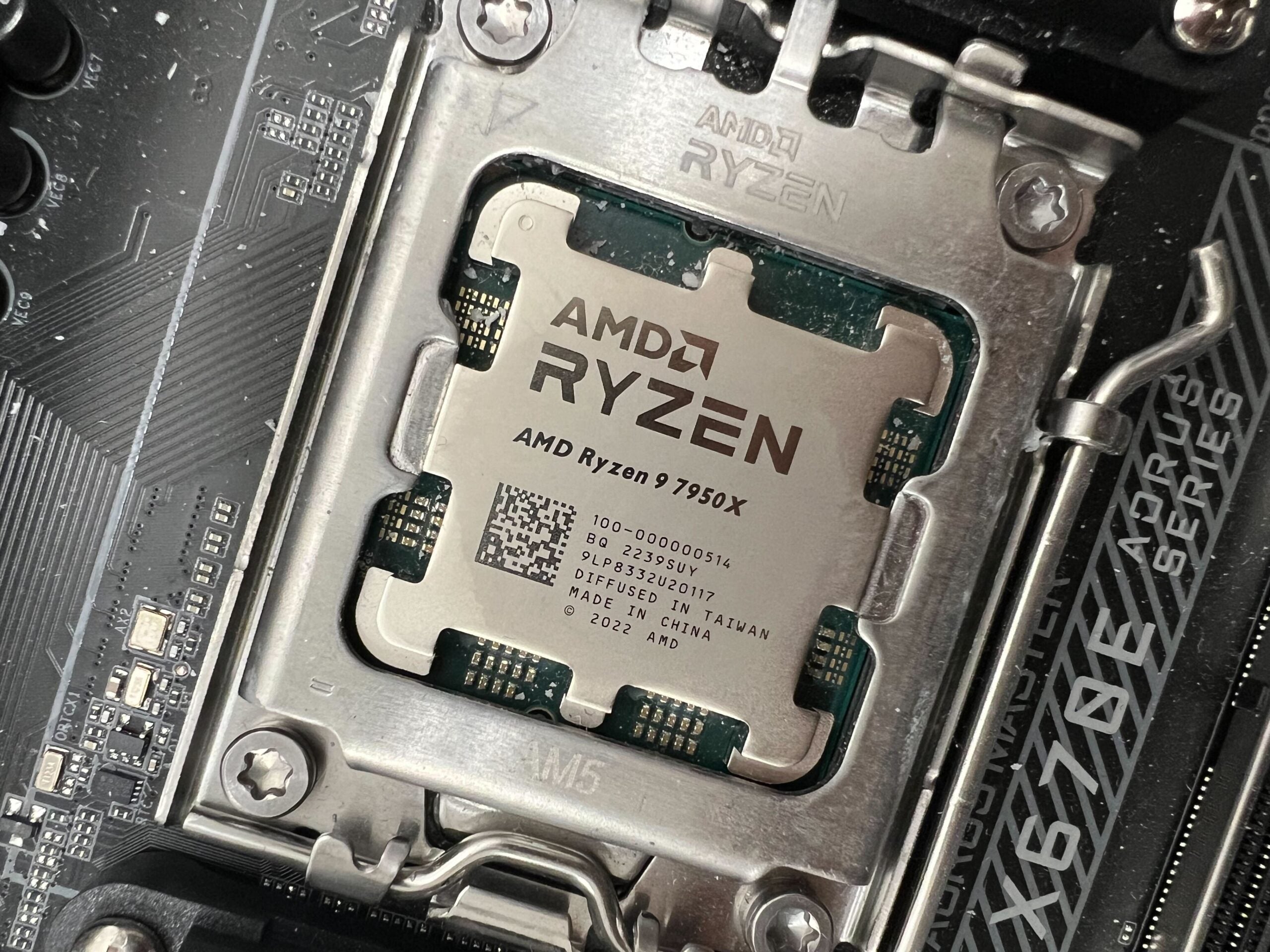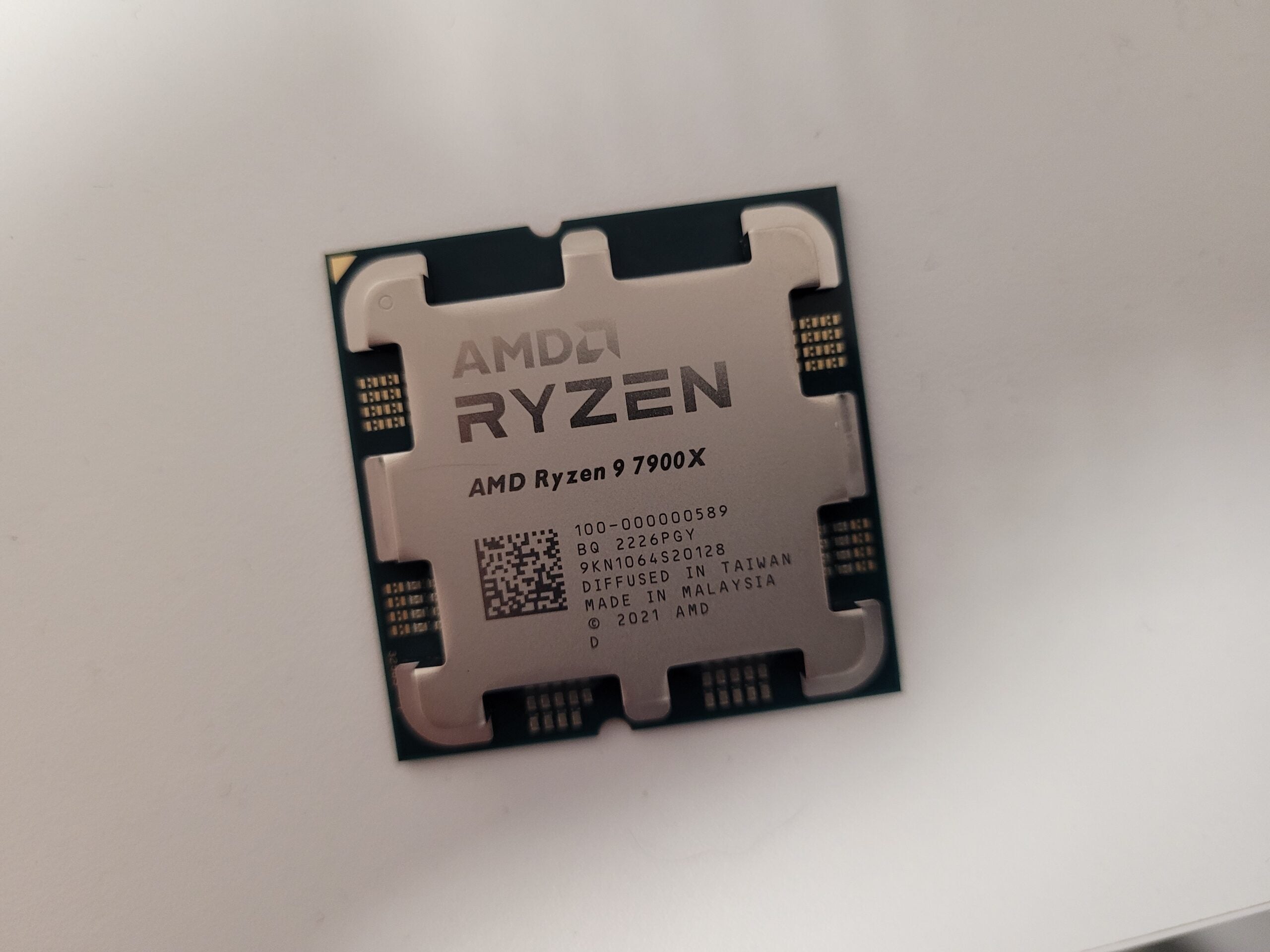AMD Ryzen 7 7700X Review
A mid-range processor from AMD
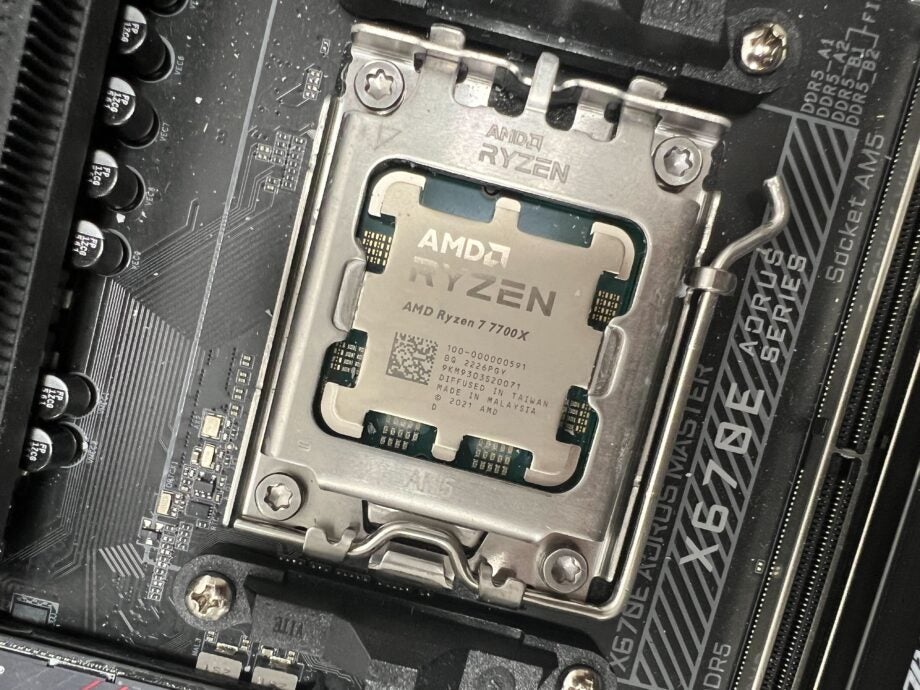

Verdict
The AMD Ryzen 7 7700X is a mid-range processor that offers up a lot of gaming power, even if it does lose out to the AMD Ryzen 9 9700X and Intel Core i9-13900K when it comes to multi-core performance.
Pros
- Solid single-core performance
- Similar gaming results to high-end processors
- Future-proofed with DDR5 and PCle 5.0
- Will not require a massively powerful cooling system
Cons
- Cheaper CPUs are available with similar gaming performance
Availability
- UKRRP: £349.99
- USARRP: $344.99
- EuropeRRP: €370
Key Features
- Zen 4 architecture Features AMD’s latest Zen 4 architecture, which offers a big performance jump over its predecessor
- 8 cores and 16 threadsPacks 8 cores and 16 threads, making it ideal for multi-core performance
- Support for DDR5 and PCle 5.0Since this CPU supports the latest technology, it will be able to raise the ceiling of your entire system
Introduction
The AMD Ryzen 7 7700X comes in as the upper-midrange choice within the new Ryzen 7000 desktop processor series. If the Ryzen 9 7900X is a little too expensive for you, this processor is the next best thing.
While the Ryzen 7 7700X processor doesn’t top the charts in the latest Ryzen 7000 Series – with those places going to the supremely powerful Ryzen 9 7900X and Ryzen 9 7950X, as well as the new 3D V-Cache chips – it still sits comfortably as one of the best processors for gaming with a price of £349/$349.99.
The number of cores and threads ensures solid multi-core performance, and the support for DDR5 and PCIe 5.0 allows you to elevate your entire setup.
But is all this enough to get the Ryzen 7 7700X processor in our Best CPU and Best Gaming CPU lists? Here is what I thought.
Specs
- Powered by the latest Zen 4 architecture
- Has support for DDR5 and PCIe 5.0
- Max boost clock speeds of up to 5.4GHz
The AMD Ryzen 7 7700X processor is a part of the new Ryzen 7000 Series, so it comes built on the latest Zen 4 architecture, using TSMC’s 5nm process node. This means that AMD has been able to add in even more transistors, with the Ryzen 7 7700X packing in 6.57 billion transistors – a massive improvement over the 4.15 billion transistors on Zen 3 architecture.
Moreover, Zen 4 has been futureproofed with support for both DDR5 RAM and PCIe 5.0. The former means that you will get the benefits of the latest memory standard, and the latter ensures your setup will be compatible with the fastest SSDs on the market.
However, since the new Ryzen processor requires an AM5 socket you will need to purchase a new motherboard, making this a costly endeavour. But the investment should ensure that your setup is viable for years to come, as well as provide a significant performance upgrade.
AMD has chosen to use 8 cores and 16 threads in this CPU, and AMD claims that it has a max boost clock speed of 5.4GHz. Considering AMD previously struggled to achieve speeds above 5GHz, this is very impressive, even outpacing the previous generation Intel Core i9-12900K, which has a max turbo frequency of 5.2GHz.
Looking back to the core count, it’s curious that AMD has chosen to stick with the same specs as the preceding Ryzen 7 5800X, although that seems to be a common theme among all of the processors from this latest series.
Thanks to the improved architecture, we are still able to see an improved generational multi-core performance, although it seems lacklustre in comparison to the 13th generation Intel Core i7-13700K, which features 16 cores and 24 threads, albeit with hybrid core technology.
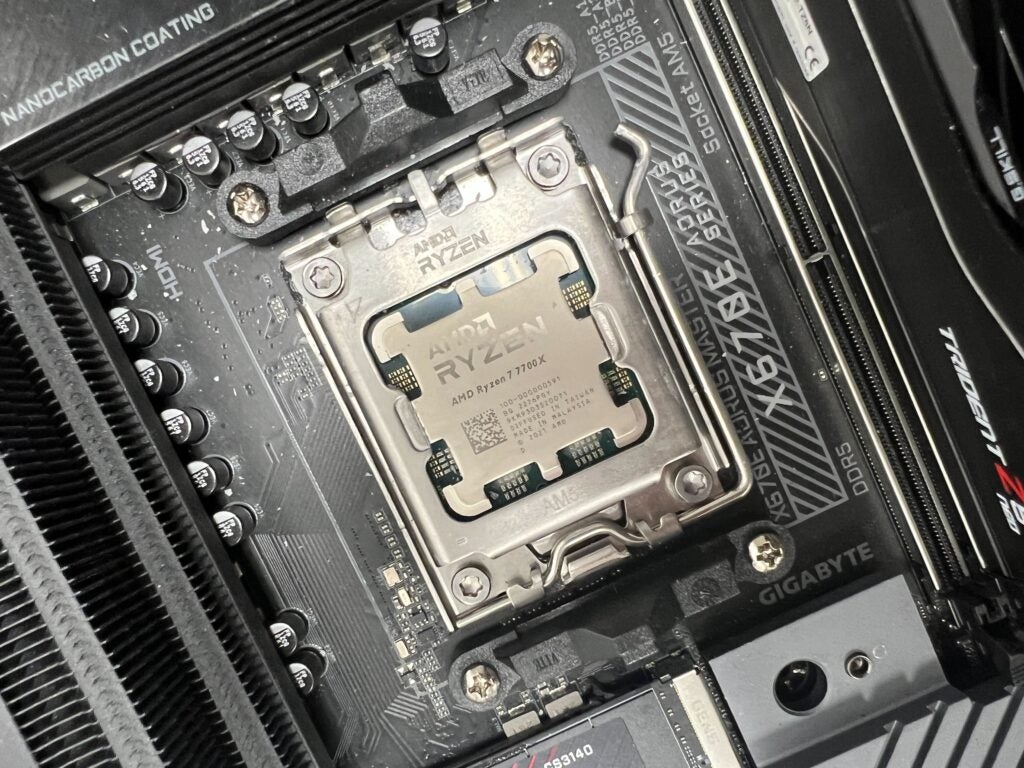
The latest Ryzen 7 7700X chip also features RDNA 2 integrated graphics architecture, meaning that you won’t need a graphics card to get your system up and running. However, this will not be able to replace a powerful discrete GPU as it does not have the power to effectively run AAA games, and you will be wasting the potential of this processor if you don’t opt for another graphics card.
But on the bright side, the RDNA 2 integrated graphics card will ensure that your system stays operational if your dedicated graphics card happens to malfunction.
Test setup
In order to delve deeper into the true performance potential of the Ryzen 7 7700X, I put it through a series of benchmark tests to check if the claims of AMD hold up.
To ensure a fair test and to keep in line with testing for other processors, I ensured to use consistent components when possible.
The build I used is listed below:
- AMD Motherboard: Gigabyte X670E Aorus Master
- Intel Motherboard: MSI Z790 Tomahawk Wi-Fi DDR4
- GPU: Nvidia GeForce RTX 3060 Ti
- Cooler: Corsair Hydro Series H150i PRO RGB 360mm liquid cooler
- OS: Windows 11
I did unfortunately have to use DDR4 memory for competing Intel chips, as I only had access to a DDR4 Z790 motherboard during the testing process. AMD’s processors are only compatible with DDR5, so it’s possible this could cause a discrepancy in the benchmark results. It’s worth keeping this in mind when looking at our benchmark results, although I haven’t noticed any unfair performance advantage for AMD when looking at our data.
I ensured to use industry-standard benchmark software, including PCMark 10, Geekbench 5 and Cinebench R23 to evaluate the performance. Moreover, to give gamers more insight into how this processor handles various games, I also included some in-game benchmarks from an array of games from recent years.
Performance
- Solid single-core performance
- Offers similar gaming performance as AMD Ryzen 9 7900X
- Not as powerful in multi-core tasks
Intel has been known to have some of the most powerful processors on the market when it comes to gaming, but AMD has shown that the Ryzen 7000 Series is more than capable of tackling both multi and single-core tasks. The AMD Ryzen 7 7700X is an upper mid-range processor, coming in between the AMD Ryzen 9 7900X and AMD Ryzen 5 7600X.
While it did not come out on top in our performance benchmark tests, it still scored admirably especially in the single-core tests.
Many of the gaming benchmark results were similar across all five chips that I tested, although the AMD Ryzen 7 7700X was able to gain a marginal lead in Dirt Rally in Full HD over the Intel Core i9-13900K, as well as slightly faster speeds in Civilization VI.
For an in-depth look at how the AMD Ryzen 7 7700X performed, check out our benchmark results below:
PCMark 10 Extended
| AMD Ryzen 7 7700X | AMD Ryzen 9 7900X | AMD Ryzen 5 7600X | Intel Core i9-13900K | Intel Core i5-13600K | |
| PCMark 10 Extended | 11,590 | 11,832 | 11,221 | 12,076 | 11,325 |
PCMark 10 Extended gives a broad view of the entire system and does not focus on one specific category, meaning that we can see holistically how the Ryzen 7 7700X performs inside a PC.
The AMD Ryzen 7 7700X reached a score of 11,590, putting it in the middle of the Ryzen 9 7900X and the Ryzen 5 7600X. Since this is the middling processor out of the Ryzen 7000 Series, this makes sense. Out of these five CPUs the latest 13th-gen Intel 13900K comes out on top, indicating that the AMD Ryzen 7 7700X is not the most powerful, but still more than good enough for productivity workloads.
While it is not listed in the table, the AMD Ryzen 7 7700X was able to beat out the last-generation Intel Core i9 chipset, (Intel Core i9-12900K) which scored 10,602 in our PCMark 10 Extended benchmark. So while it cannot compete with the 13th-gen Intel i9 chip, is it an upgrade on the 12th generation.
Geekbench 5
| AMD Ryzen 7 7700X | AMD Ryzen 9 7900X | AMD Ryzen 5 7600X | Intel Core i9-13900K | Intel Core i5-13600K | |
| Geekbench 5 Single | 2059 | 2181 | 2054 | 2178 | 1950 |
| Geekbench 5 Multi | 13,662 | 18,768 | 11,055 | 16,491 | 12,788 |
Geekbench 5 focuses specifically on the performance of the CPU, breaking it down into single-core and multi-core performance. Single-core performance is the most important when it comes to gaming, while multi-core is a more important consideration for intensive creative workloads such as 4K editing or photo editing.
Once again, the AMD Ryzen 7 7700X sits in between its two siblings, as well as sitting between the Intel i9-13900K and Intel i5-13600K processors.
Cinebench R23
| AMD Ryzen 7 7700X | AMD Ryzen 9 7900X | AMD Ryzen 5 7600X | Intel Core i9-13900K | Intel Core i5-13600K | |
| Cinebench R23 Single | 1984 | 1999 | 1926 | 2337 | 1996 |
| Cinebench R23 Multi | 19,748 | 27,528 | 15,119 | 38,088 | 23,821 |
Cinebench R23 also emphasises the capabilities of the CPU, but unlike Geekbench it is a lot more taxing and simulates intensive content-creation applications. This makes it one of the best benchmarks for creative workloads.
The Intel Core i9-13900K scored the highest in both categories, doubling the performance offered by the Ryzen 7 7700X when it came to multi-core performance. That’s not too big of a surprise – the Intel i9 is £200 more expensive after all – but does show the Ryzen 7’s limitations when it comes to heavy workloads such as 3D animation.
Horizon Zero Dawn
| AMD Ryzen 7 7700X | AMD Ryzen 9 7900X | AMD Ryzen 5 7600X | Intel Core i9-13900K | Intel Core i5-13600K | |
| Horizon Zero Dawn 4K | 53fps | 53fps | 53fps | 54fps | 54fps |
| Horizon Zero Dawn Quad HD | 95fps | 94fps | 95fps | 95fps | 95fps |
| Horizon Zero Dawn Full HD | 118fps | 118fps | 118fps | 118fps | 117fps |
We’re moving onto gaming benchmarks now, which will give us a better idea of how this CPU affects the framerate performance in games. It’s important to note that the GPU will have more impact on the performance, and an upgraded GPU will cause more noticeable improvements than a new CPU, so don’t expect massive gains here.
Looking at the scores for Horizon Zero Dawn, all processors were able to hit very similar scores, with the AMD Ryzen 7 7700X coming out at even or 1fps lower than the high-end AMD Ryzen 9 7900X and Intel Core i9-13900K.
The Intel Core i9-12900K, while not listed in this table, did score lower in all categories when compared to the AMD Ryzen 7 7700X. In the 4K benchmark, it scored 46fps compared to the Ryzen 7’s 53fps, and just 94fps in the Full HD benchmark. This shows that the Ryzen 7000 Series is a huge upgrade when compared to the 12th generation of Intel processors.
The AMD Ryzen 5 7600K also scored surprisingly well, only 1fps lower than the Intel Core i9-13900K during a 4K test. Since the gaming performance between each processor is almost identical, it may be worth investing in a cheaper processor, as the GPU will be doing most of the heavy lifting.
Dirt Rally
| AMD Ryzen 7 7700X | AMD Ryzen 9 7900X | AMD Ryzen 5 7600X | Intel Core i9-13900K | Intel Core i5-13600K | |
| Dirt Rally 4K | 72fps | 72fps | 72fps | 74fps | 73fps |
| Dirt Rally Quad HD | 129fps | 129fps | 129fps | 138fps | 132fps |
| Dirt Rally Full HD | 192fps | 192fps | 180fps | 185fps | 183fps |
Dirt Rally is a lot less taxing on a PC than Horizon Zero Dawn since it launched in 2015 and has less demanding graphics. We use this benchmark to see how various processors handle older titles and if they can boost the performance.
The AMD Ryzen 7 7700X saw almost identical results to all the other CPUs in 4K, but fell a little short compared to the Intel Core i9-13900K and Intel Core i5-13600K in Quad HD.
The most interesting scores came from the Full HD test, which saw both the Ryzen 7 7700X and Ryzen 9 7900X stand head and shoulders above the Intel rivals, with a gain of 7fps.
Since this performance gap is not huge, the difference shouldn’t be substantial enough to sway your buying decision either way. But it shows that the AMD chip is more than capable of running older games with a smooth frame rate.
Borderlands 3
| AMD Ryzen 7 7700X | AMD Ryzen 9 7900X | AMD Ryzen 5 7600X | Intel Core i9-13900K | Intel Core i5-13600K | |
| Borderlands 3 4K | 38fps | 38fps | 38fps | 38fps | 38fps |
| Borderlands 3 Quad HD | 68fps | 68fps | 68fps | 69fps | 69fps |
| Borderlands 3 Full HD | 97fps | 97fps | 96fps | 96fps | 96fps |
Borderlands 3 is a taxing shooter that is more reliant on GPU power than on the CPU. This means a new processor may not have a big effect on performance.
The AMD Ryzen 7 7700X performed consistently in this test, coming out with very similar scores in comparison to its AMD siblings as well as the Intel Core i9-13900K and Intel Core i5-13600K. It was able to achieve 1fps higher than Intel in the Full HD test, but overall, it looks like all these processors are more than capable of running the game at a high frame rate.
When you consider that the AMD Ryzen 5 7600X broke even in the 4K and Quad HD test (coming at just 1fps lower in the Full HD test) it proves that you don’t necessarily need the most powerful CPU in the new range.
Total War: Warhammer 3
| AMD Ryzen 7 7700X | AMD Ryzen 9 7900X | AMD Ryzen 5 7600X | Intel Core i9-13900K | Intel Core i5-13600K | |
| Warhammer 3 Battle (4K) | 33fps | 33fps | 33fps | 33fps | 33fps |
| Warhammer 3 Campaign (4K) | 24fps | 28fps | 25fps | 23fps | 23fps |
Total War: Warhammer 3 is the newest addition to our testing and is the most demanding game yet. Despite using an RTX 3060 Ti GPU in the testing rig, none of the processors was able to run this game at over 30fps at 4K in Campaign mode.
In 4K Battle mode, every processor was able to hit 33fps, but the AMD Ryzen 7 7700X was only able to hit 24fps for the campaign, marginally beating Intel’s chips but falling behind the AMD Ryzen 7 7700X.
Civ VI
| AMD Ryzen 7 7700X | AMD Ryzen 9 7900X | AMD Ryzen 5 7600X | Intel Core i9-13900K | Intel Core i5-13600K | |
| Civ VI turn time (in seconds) | 6.96 s | 6.91 s | 7.18 s | 7.01 s | 6.86 s |
The last benchmark differs from the rest, as instead of measuring the frame rate performance we look at how long it takes the AI to make calculations in the game Civilization VI. For this test, the lowest number is the most impressive, as it means that the AI needs less time to make decisions.
The quickest processor was surprisingly the Intel Core i5-13600K, but the AMD Ryzen 7 7700X was not far behind, coming in as the third fastest overall with a score of 6.96 seconds and just 0.10 seconds slower than the Intel i5. Interestingly, the Intel i9 chip was the second slowest, hitting just over 7 seconds.
Power consumption and heat
- Great power efficiency
- Does not run too hot
| AMD Ryzen 7 7700X | AMD Ryzen 9 7900X | AMD Ryzen 5 7600X | Intel Core i9-13900K | Intel Core i5-13600K | |
| Idle Power Draw | 81.1W | 78W | 73.5W | 60.9W | 58W |
| Peak Power Draw | 209.3W | 216W | 168.5W | 354W | 343W |
It’s important to consider how much power your PC is consuming, both while it’s sitting idle and while it’s being used, so you can save on your own energy bills.
The idle power draw of the Ryzen 7 7700X is more intensive than its younger sibling, the Ryzen 5 7600X, and both the Intel i5 and i9 chips. I recorded a power consumption of 81.1W with no software running other than Windows 11.
However, the Ryzen 7 7700X performed a lot better once it was under stress; I ran a Cinebench R23 (multi-core) benchmark and it resulted in a power draw of 209.3W. This is not particularly low, with the Ryzen 5 7600X only consuming 168.5W, but it is a significant improvement on 13th-generation Intel chips, which both reached over 340W of power.
| AMD Ryzen 7 7700X | AMD Ryzen 9 7900X | AMD Ryzen 5 7600X | Intel Core i9-13900K | Intel Core i5-13600K | |
| Idle CPU temperature | 37°C | 40°C | 39°C | 33°C | 27°C |
| Peak CPU temperature | 86.75°C | 95.5°C | 88.88°C | 100°C | 94°C |
The temperature of the CPU is also something to keep in mind, as it will have a big impact on what type of cooling system you need to invest in, and how much headroom you have for overclocking.
While sitting idle, the Ryzen 7 7700X recorded a temperature of 37°C, putting it between the Ryzen 5 7600X and the Intel Core i9-13900K processors.
To measure the peak CPU temperature, I used the PCMark 10 Extended benchmark. The Ryzen 7 7700X scored the lowest temperature out of the four processors listed above, scoring a respectable 86.75°C. This suggests that you will not need to invest in a particularly high-end cooler to maximise performance.
Latest deals
Should you buy it?
You want a multi-talented processor that is future-proofed:
While the AMD Ryzen 7 7700X did not come out on top in our performance tests, it excelled in the single-core tests and will still be more than powerful enough for multi-core tasks, like content creation. The inclusion of DDR5 and PCIe 5.0 also means that your PC should be future-proofed for at least a few years.
You only want a processor for gaming:
If you are only looking to play games with this CPU, you don’t need to invest in the AMD Ryzen 7 7700X. The AMD Ryzen 5 7600X offered up consistently similar scores during our gaming benchmarks and can be picked up for around £100/$100 less.
Final Thoughts
The AMD Ryzen 7 7700X is a mid-range processor but it can still hold its own against the AMD Ryzen 9 7900X and Intel Core i9-13900K when it comes to single-core performance and gaming benchmarks. This is a great chip if you’re interested in both gaming and content creation but don’t need the excess power of a top-end CPU.
The inclusion of PCIe 5.0 and DDR5 should also raise the performance ceiling of your entire system and future-proof your PC for a few years.
However, if you are only interested in gaming then I recommend checking out the AMD Ryzen 5 7600X since it was able to perform almost identically during our gaming benchmarks.
How we test
We always review multiple CPUs at once to compare data, using consistent components for fair testing where possible.
We use a mix of both synthetic and in-game benchmarks to gauge performance, while also considering additional features and pricing.
Use the same components where possible for fair testing.
Use both synthetic and in-game benchmarks for testing
Test both CPU temperature and power consumption.
FAQs
The Ryzen 7 7700X processor costs £439/$449, making it more expensive than the 13th-Gen Intel Core i5-13600K but cheaper than the Intel Core i9-13900K.
No, the Ryzen 7000 Series only supports motherboards with a DDR5 slot, meaning that you cannot use DDR4 RAM with this processor.

